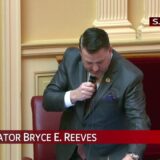The head of a longtime program to track the potency of marijuana seized by law enforcement—the federal contract for which was cut earlier this month by the federal Department of Government Efficiency (DOGE)—says it’s still possible his work could limp along until funding resumes.
But if samples stop flowing to his Mississippi lab, a decades-long history of THC levels in the illicit U.S. cannabis supply will soon come to an end, he says.
The Trump administration last week announced the cancelation of the testing contract, which historically has been awarded to the University of Mississippi. For decades, the school was also the sole federally authorized cultivator of marijuana for research purposes.
The potency monitoring program has tested marijuana samples seized by the Drug Enforcement Administration (DEA) and other law enforcement agencies since the early 1970s, and its findings undergird popular claims by politicians, media and public health officials that cannabis potency has ballooned in recent decades.
Data collected through the program indeed show a gradual increase in THC (and little change in CBD) content over the last three decades. Samples collected in 1995 showed an average of 3.96 percent THC, for example, compared to 16.14 percent THC in 2022.
Mahmoud ElSohly, the Ole Miss pharmacologist who helms the school’s Marijuana Research Project, told Marijuana Moment in an interview that he recently received the termination notice tied to the DOGE-canceled contract.
“I read through it, and it basically said, ‘You need to stop doing stuff except for things that are already in progress; finish what you have in progress,’” he said. “So don’t analyze any new samples, don’t request samples to come here.”
Despite those instructions, the researcher is trying to figure out if at least some of the work can carry on.
The notice said that “other activities could be continued, and they give some conditions for those to be continued,” ElSohly pointed out. “One of those those conditions is if termination of that activity would be detrimental or have negative impact, loss to the government—something to that meaning.”
ElSohly’s big hope is that DOGE’s cancellation of the immediate contract doesn’t stop the flow of samples to his lab, even if it does temporarily halt testing. He noted that the program encountered a separate funding gap about a decade ago but was able to avoid any major interruptions.
“When they stopped funding that, we continued to receive the samples,” he said. “Not too long after that, they decided, ‘Oh, this thing really needs to be taken care of.’”
DOGE, of course, has over the past few months occasionally canceled funding for programs as part of its deep cuts to the federal government only to reverse course and reinstate individual contracts.
ElSohly told Marijuana Moment he wasn’t able to reach the contracting officer for the program by phone, so he sent an email making the case that cutting the program would in fact be detrimental to the government.
“I said I really need—at no additional cost to the government or NIDA [the National Institute on Drug Abuse]—I need to continue to receive the samples through law enforcement,” he explained. “Once I have the samples, we can analyze them when you have the money to analyze.”
“But if I don’t get the samples, and the DEA labs or law enforcement dispose of those samples,” he added, “then this is information that’s lost forever.”
ElSohly has been working on the monitoring project since 1976, becoming its director in 1981 after his predecessor left to become a drug policy advisor to the Reagan administration.
Reached on a family vacation late last week, he said that ultimately the decision rests with the government as to whether or not the potency monitoring will continue. But he emphasized the value of the program, noting that its findings have been used by numerous government agencies and politicians over the decades who’ve tied marijuana’s increasing potency to issues like emergency room admissions and other health concerns.
It’s also allowed his University of Mississippi team to produce marijuana for research purposes that more closely resembles products found on the unregulated market, he said.
And although many Americans now buy marijuana that’s regulated and lab-tested for potency, ElSohly contended the program still shines a light on what’s in products that fall outside legal boundaries.
“Monitoring what’s actually out there is very important,” he said. “The fact that the regulations might change one way or the other doesn’t mean that the illicit market is going to be following the regulations.”
While ElSohly believes that findings from the illicit marijuana potency monitoring program have offered a valuable perspective on THC levels in America’s marijuana supply, others in the cannabis space say the effort is far from essential.
Paul Armentano, deputy director of the advocacy group NORML, described the program as “arguably well-intentioned” but said that “far too often it provided data of limited significance that was far more likely to be used to facilitate political agendas rather than legitimate scientific purposes.”
“In the program’s infancy, by investigators’ own admission, researchers only had access to degraded marijuana samples of artificially low potency,” he told Marijuana Moment in an email. “In the 1980s and 1990s, samples included feral ditch-weed—which skewed the program’s overall results. In recent years, budget cuts led to investigators to reduce the overall total of samples tested to the extent that it became difficult to gain any accurate sense of national potency trends or assess year-over-year comparisons.”
“In short, over the lifespan of this program, there always existed significant limitations to the data it produced,” Armentano said. “Further, the advent of state-specific cannabis potency testing, which allows state-licensed researchers to assess a far greater array of cannabis samples for purity and potency than was ever previously possible by the U-Miss program, has in some ways made the need for this program nearly obsolete.”
According to USAspending.gov, $30,155.76 of the total $142,839.00 contract amount has already been outlaid to the university.
The government spending site says the contract has now been terminated “for convenience” as of May 1 as part of “implementing the president’s Department of Government Efficiency cost efficiency initiative.
The contract cancellation comes about two months after DOGE separately promoted the end of a grant meant to fund a study examining cannabis use risks among LGBTQ+ individuals, non-binary people and heterosexual women.
Many advocates had hoped that, rather than inhibiting cannabis research, Elon Musk and his team at DOGE would seek to cut costs by targeting agencies such as DEA that have perpetuated marijuana criminalization.
Instead, DEA has ramped up recruitment—recently urging people to join them on the frontlines of the “war on drugs,” even if they currently work as a “coffee barista” or otherwise have a non-law enforcement background.
It was also recently revealed that “marijuana” is one of nearly two dozen “controversial or high-profile topics” that staff and researchers at the National Cancer Institute (NCI) are required to clear with higher-ups before writing about, according to a leaked memo from within the federal agency.
DOGE’s Musk, meanwhile, said in February that he thinks it’s a “great idea” to mandate drug testing of federal employees as he pushes to make massive cuts to government agencies and spending.
In response, a Democratic congresswoman filed a bill that would require Musk and other DOGE workers to submit to drug testing to maintain their “special government employee” status.
While DOGE has made cannabis research-related grant cuts, the U.S. Department of Veterans Affairs (VA) recently announced that it’s looking for contractors to analyze and explain scientific evidence on medical marijuana to clinicians and the general public as part of its Systematically Testing the Evidence of Marijuana (STEM) project.
Photo courtesy of National Institute of Standards and Technology.






























